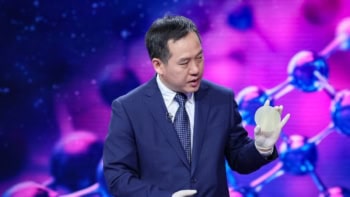Books still have the power to connect with people in more profound ways than other more immediate media, and a good book can provoke questions that stay with the reader long after turning the final page. In a new move, Physics World has expanded its coverage of the literary world by creating a series of podcasts devoted to physics books and the issues they raise
The shows – the first of which you can hear above – are designed to uncover the stories behind the stories, as they will look at the themes present in some of the books recently reviewed in Physics World and on physicsworld.com. Presented by reporter James Dacey, alongside Physics World‘s editor Matin Durrani and the magazine’s reviews editor Margaret Harris, the shows will also include interviews with some of the authors of the books being reviewed, who will discuss the ideas and inspirations behind their latest publications.
Our first programme considers the theme “women in science”. The show begins with an interview with the feminist historian Julie Des Jardins about her book The Madame Curie Complex [running time 1.38]. Des Jardins offers some fascinating ideas about the sort of challenges that women face when considering a career in science, and why Curie is as much a hindrance as an inspiration.
Following on from this, Margaret provides an interesting historical overview of the brother–sister astronomy pairing of William and Caroline Herschel, as told in Michael Hoskin’s book Discoverers of the Universe [running time 8.44]. Harris describes how the Herchels, who hailed from Germany, went to work in England in the late 18th and early 19th century with Caroline helping William to become of one the most influential astronomers of all time. Harris discusses how, historically, this male-leader–female-assistant relationship represented one of the few ways that women could participate in science.
The sexist norms of the period kept Caroline Herschel in her brother’s shadow for much of her life. But can a similar case be made for the early 20th-century physicist Mileva Maric – better known as Albert Einstein’s first wife? In his book Science Secrets: The Truth About Darwin’s Finches, Einstein’s Wife, and Other Myths, Alberto Martinez argues that this assertion, along with many other popular stories in the history of science, is likely to be false. But the truth, he argues, is no less interesting. The Physics World presenters discuss the merits of Science Secrets and whether Martinez could ever be successful in his mission to debunk some of the common myths of popular science [running time 10.55].
The final book under discussion is Soft Matter: the Stuff that Dreams are Made Of by Roberto Piazza [running time 13.54]. The connection to the women in science theme is perhaps less obvious than with the other titles but it is there, and for some reason the book managed to really irritate Matin.
In the next podcast to be released in December, the Physics World team will be discussing a selection of their favourite books reviewed in 2011, and announcing the magazine’s top 10 books of the year. In the meantime, you can continue to read book reviews each month in Physics World and on physicsworld.com.



